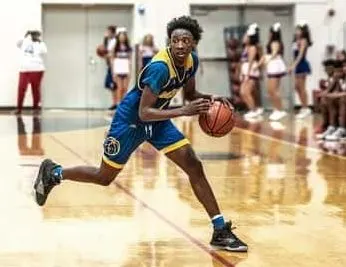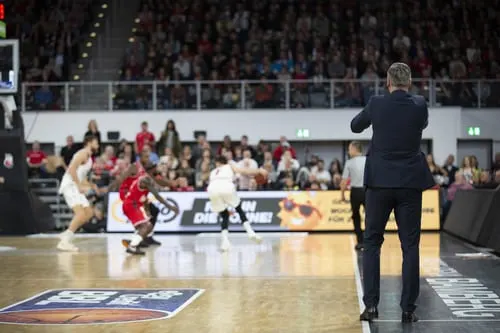Basketball players are known for a lot of strange habits and rituals. Never did I think I would see the day that a player would have to cover their mouth before or after a game to talk to someone. This is the common theme between two superstar players from opposing teams.
Why do basketball players cover their mouths when they talk? Basketball players cover their mouths with their hands, shirt, or jersey because they do not want anyone to hear what they are saying. They also cover their mouth because they don’t want anyone to read their lips. This not only happens before and after games with opposing players, but this also happens during a basketball game when teammates are strategizing the next play they want to execute.
Besides talking strategy with another teammate, it does sound strange, that a player would need to cover their mouth and lips to speak to another player from the other team. As a fan or teammate, I would wonder what do you have to hide, that makes it necessary to do this.
If you are thinking about buying a basketball jersey or shoes, check out the offers below from these retailers.
| Retailer | Promo Code | Promotion | Link to Retailer |
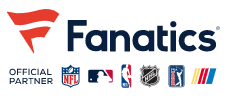 | DROP | 70% OFF | Go to Fanatics |
 | PARSCR20 | 20% OFF | Go to Eastbay |
 | N/A | N/A | Go to Amazon |
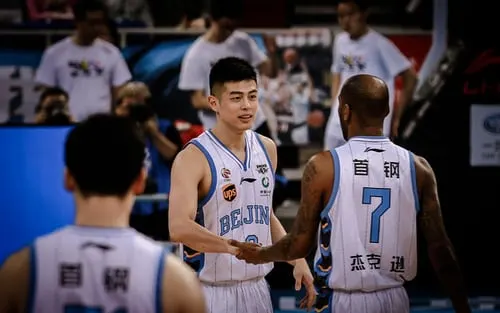
Players covering their mouth to talk strategy
When you are playing basketball at a high level, it can be a back and forth battle like a boxing match or a strategic battle like chess.
Most often then not good players will strategize with teammates on what their next move will be to score a basket.
This is a way of communicating on the basketball court so the players involved are all on the same page.
Let’s say hypothetically, the basketball goes out of bounds due to a poor pass by your teammate, the whistle is blown by the referee.
Luckily it went off the defender’s hand as he was trying to intercept the pass, which means it’s still your team’s ball.
As the referee is retrieving the basketball, your teammate comes over to tell you what to do next. He wants you to fake towards the ball and go backdoor as he dribbles toward you on the wing.
The ball is in-bounded and the play in question is executed and worked for an easy basket.
When players communicate this information to their teammates, most often they are covering their mouth and lips with their hand or jersey as they do not want to give away any information to the opposing team as to what they are planning.
It is not enough to speak quietly or move away from a player as it is possible for the defenders to hear the commands or read the lips of the player giving instructions.
While also speaking to the player it allows the player to be as quiet as possible by blocking the sound waves in a player’s voice so the players around may not hear.
When a player calls a play
Playcalling can be disguised with different names on defense like “Red” for full-court press or “Blue” for zone.
On baseline, in-bound plays I have ran such plays called “Rabbit” or “Box”.
These are just a few names for different plays during a basketball game when on offense and defense.
What tends to happen during a game is that a team will be familiar with the plays in which you’re running after hearing them a couple of times.
When this happens teams adjust and will be ready as soon as you call the play.
This is where it can be important for a captain or the point guard to receive cues from the head coach as to what play he wants the team to run next.
The best way to communicate without having to yell out the names of plays can be immediately following a dead ball or foul.
The point guard will yell at his teammates to huddle and will let the other four players known what play is next.
Many players are sly and quick to go undercover and try to hear what the team is trying to plan.
This way the team has an equal advantage and are not surprised by anything when a team tries to run the play in question.
This is why it is important for the communicator to cover their mouth and not allow anyone to read their lips.
What are NBA superstars saying when they talk?
This is something that has been happening a lot in the NBA, players before and after the game are speaking to other members of the opposing team.
The spotlight is on them, cameras, lights and every type of recording device is 5 feet away.
There is no privacy once you’re in the arena as a basketball star.
Many players in today’s NBA have close friends with those on their team, but especially on opposing teams.
Many people often wonder what is actually being said by two superstars on opposing teams, that is has caused rumors to spread.
Lebron James was well known for this and still is speaking to players after games using his shirt, or jersey to cover his mouth.
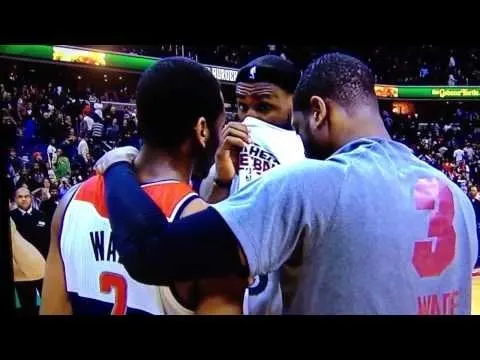
The NBA community absolutely loses it when this happens and especially if one of the player’s contracts is up for negotiation.
This usually leads to rumors of players signing with other teams where their superstar friends are playing.
One such rumor surfaced when Kyrie Irvin and Kevin Durant were both at the end of their contracts and were continuously speaking after playing basketball games.
The rumor mill was that they were planning to team up. Which actually became true.
Many of those conversations involved the two speaking to each other covering their mouths so no one around them could hear.
While also making sure no one could read their lips, as there would be a team of investigators dissecting their body language and reading their lips as to what was being discussed in slow motion on video.
This today is a common theme in the NBA, players tramming up in hopes to win a championship, whatever happened to texting or a phone call from a payphone if your so worried, do they even make payphones anymore.
Whatever the case may be their will always be a way to get the message across without getting caught.
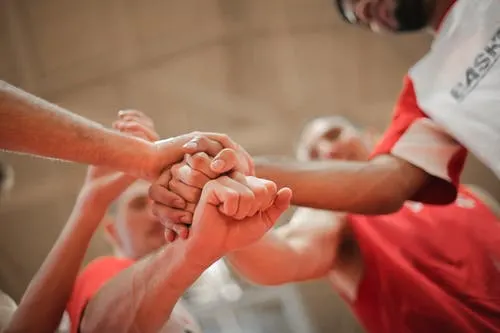
Players cracking jokes on the bench
Basketball is a fun game especially when you are winning.
There are times when players have a lot of fun watching their friends on the court who sometimes do not get a whole lot of playing time compared to the starting five.
Players love to watch their teammates get the opportunity to show what they’re made of.
Teammates will have fun joking around and laughing if they think something on the court is funny, especially when their teammate might pull a Shaqing-A- fool type play.
This happens when a player is nervous due to the lack of experience playing in the game.
This will lead to players laughing and commenting on the play in question.
Usually, players are leaning over on other players laughing their heads off and covering their mouth with a towel, making comments on exactly what they found funny on the court. Sometimes adding exaggerating comments.
Let’s not sugar coat it, basketball players aren’t angels and sometimes the comments are inappropriate.
Players will cover their mouth as they are making these types of comments about the game, the referees, and even the fans.
TIP: Shaqing-A-Fool is a highlight reel on TNT by Shaquille O’Neal that shows the worse basketball plays of the NBA for the week.
Do coaches cover their mouths during games?
Yes, a coach might use their clipboard or hand to cover their mouth when discussing the next play with players who are on the court or are ready to be substituted into the basketball game.
They will also do this with coaching staff sitting on the bench, next to them. Sometimes this will discuss what player will be subbed into the game.
This is why I always recommend players who are not in game to sit as close to the coaches as they can, to build up basketball I.Q., and learn the coaches system as much as they can to increase playing time.
Does this happen in other sports?
Yes, play-calling and strategizing happens in all sports, from a baseball player using their glove to communicate with the catcher on the mound.
From a coach in football using his clipboard to cover his mouth to speak into his headset to the quarterback.
Even if a player knows the play call in question is still a matter of stopping it.
When I coached basketball, we would run plays during a practiced scrimmage.
Everyone in the gym knew the play that was being called, the players would complain to me that the other team knows the plays.
I would tell them of course they know the plays they are your teammates. If it can work on your teammates it will easily work during a game.
Sure enough, they struggled at first because every player anticipated what the next move was, but they started to improvise and created other moves in the play they could use go if the initial play was not available.
